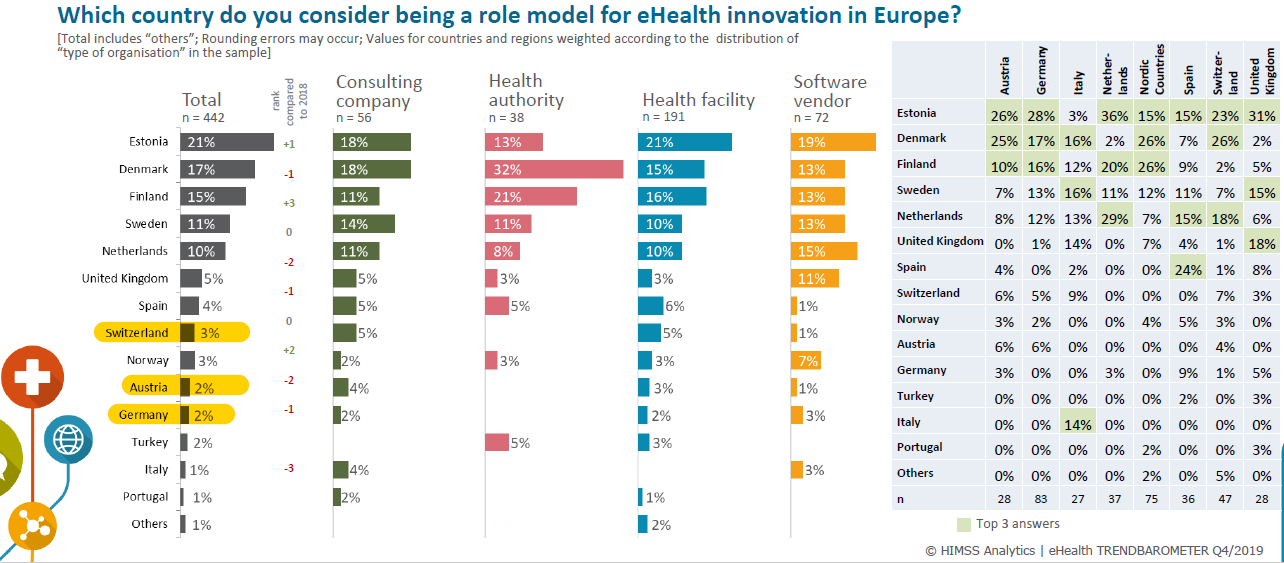This is Part 2 of the “COVID-19 and the Future of Healthcare Delivery” article we’re publishing with our friends at Frontline Ventures. Frontline focused on developments in the UK. This piece will look at developments in Germany, Austria and Switzerland (a.k.a. D-A-CH) and how this has affected trends and local startups in these regions.
Why COVID-19 unleashed a buzz of telehealth activity…
Health care professionals globally have witnessed a surge of telehealth and new tech in recent months. Four underlying factors made this change happen so quickly:
- Health delivery is mostly inelastic and telemedicine’s widespread adoption has, so far, been held back by a “lack of acceptance of telemedicine solutions” by healthcare providers (EU Commission: Market Study on Telemedicine, 2018) more than anything else. With COVID-19, providers had no choice but to adapt.
- The COVID-19 crisis is, above all, a health crisis. Decision-makers in policy and business focused on how to deliver healthcare efficiently, effectively, and quickly — with unusual flexibility.
- Many useful tools have been around for a long time, notably the telephone or video conferencing, they’ve just never been used so heavily.
- Patients in 2020 are used to remote, digital communication.
… but change was slower in DACH than in the UK…
Despite the pace of change, health systems in Switzerland, Germany and Austria are less monolithic compared to, say, the UK NHS. The rapid change witnessed elsewhere didn’t materialize as quickly, because:
- Health delivery and financing in all three countries is more fragmented and decentralized than, say, in the UK or France. Regional governments, payors and providers have more leverage over execution, while central rule-setting is more high-level.
- Decision-making is a multi-stakeholder process involving more parties and veto-points on the payor, provider and policymaking levels than in the UK.
- Health systems are strongly regionalized, pockets of innovation co-exist within slow-moving larger frameworks
… and rules governing telehealth only changed incrementally in DACH
As a result, a sweeping move like the NHS’ fast-tracking of telehealth tenders at a national level is not feasible in the German-speaking world. All three countries have made only incremental adjustments to allow for more telehealth delivery. Most changes also have sunset clauses that limit their effect until the end of the pandemic.
Key changes in Austria have included reimbursing remote consultations by health professionals at the same rates as offline consultations. Tight rules around prescriptions have been loosened to allow for phone-based prescriptions. The national electronic prescription system (e-Rezept) has seen heavy use as doctors send prescriptions straight to pharmacies, instead of making patients visit both in turn.
Germany implemented similar measures. Most are also limited until mid-2020. Remote referrals and prescriptions are allowed, GPs can onboard new patients via phone without an electronic patient card, and reimbursement options for phone/video consultations have been expanded slightly. A rule that only 20% of GPs’ patient turnover can be remote consultations was lifted.
Switzerland has made it easier for doctors and clinicians to bill remote work, but overall rules remain stricter than in Austria and Germany. Video consultations have been prioritized over voice-only calls and reimbursement remains less generous for telemedical consultations than for traditional delivery. Many rules and changes vary significantly at the Cantonal level.
Overall, the rules governing telehealth in DACH have not been upended by COVID-19. This is not surprising: Asked for eHealth role models, 442 eHealth stakeholders ranked DACH countries at the bottom of the pack in the Q4 2019 annual HIMSS eHealth survey:

Startups leading the way from below
Even if sweeping change in telehealth didn’t materialize, consumers, patients and health care professionals have experienced new levels of opportunity and convenience in health care. This has given startups an opening to prove their value while others benefit indirectly from greater openness towards new tech. Below are areas in which COVID-19 has created momentum for new players.
Remote patient care
Remote patient care is the obvious COVID-19 use case. Some of the players operating “classic telemedicine” in Germany have reported hypergrowth: treatments on Munich-based Teleclinic have grown 250% since January, Kry (from Sweden, but aggressively entering Germany) grew appointments by 350% from February to March, and the patient/doctor matching platform Jameda claims that demand grew by more than 1000% since March. Riding this wave, Swiss generalist telehealth provider Onedoc and the Austrian GP portal DRD have made their video conferencing available for free.
Telehealth has also entered more niche domains. The founders of Kinderheldin, a midwife-on-demand service from Germany, are experiencing strong demand growth for consultations around pregnancy and postpartum health. Ada Health, a German symptom assessment platform used across the globe, was quick to implement a free COVID-19 assessment app. As in-person consultations remain complicated, we also expect demand growth for specialized providers such as German MSK providers Kaia Health or Vivira, German digestive health companion app cara.care or the Swiss online dermatologists at Onlinedoctor.ch. Caspar, a German patient engagement platform for rehabilitation clinics, has offered free signups for clinics that are currently struggling to connect with their patients and keep utilization rates up.
Mental health
One byproduct of COVID-19 is a mental health crisis. Several startups play in this arena. Kenkou from Berlin provides individualized stress management tools. Another German startup, Hellobetter, offers psychological training online to increase resilience and is running “Calm through the crisis” courses during the pandemic. Instahelp from Graz, Austria, is a B2C marketplace and telehealth platform for psychologists.
Outside of the medical world, Speedinvest portfolio company CoachHub, a digital business coaching provider, has seen regular business slow down slightly, but increased requests for COVID-19 “relief coaching”, and management expects a long-term tailwind from greater openness toward remote tools.
UPDATE: Also from Germany, Sympatient offers VR-based anxiety treatment and Selfapy offers clinical-grade self-therapy online.
Hospital and clinic logistics including staffing
In hospitals and clinics, COVID-19 has meant a convergence of demand peaks and staff shortages. One result has been the rapid adoption of appointment booking platforms and video consultation tools. French booking and video-call platform Doctolib has seen bookings for online consultations in Germany grow by 60% week-on-week since COVID-19 began, and German booking player Samedi onboarded 500 new doctors. Inefficiencies around staffing may also drive medium-term demand for medical staffing marketplaces Medwing and Medlink from Germany.
Remote elderly care
Caring for the elderly has been a special challenge during COVID-19. It is not surprising, then, that Munich-based Nui Care, a B2C app that helps caregivers and families coordinate care for their elderly family members, has offered reduced entry rates. Myo, a secure communication platform that connects patients and caregivers in care homes with patients’ families, has expanded from 40 to 60 care homes since COVID-19 began. Interestingly, mobile care marketplace Talea from Berlin has reported no COVID-19-related increase in demand as face-to-face interactions remain heavily restricted.
Data management & analytics
One learning out of COVID-19 has been that providing timely, accurate data is key to delivering health at scale. Berlin-based Aicura enables machine learning across data that lives in different silos across the health care system. Heartbeat Med from Berlin have facilitated tele-triage by making their patient tracking solution available for COVID-19 symptom monitoring. Smart Reporting from Munich has provided a free COVID-19 reporting template to radiologists as part of its automated reporting suite, to cut the time to diagnosis. Vienna-based Speedinvest portfolio company medicus.ai, an AI platform that explains blood tests and medical reports, launched a free COVID-19 personalized support and self-monitoring app to similar effect.
UPDATE: Austrian Xund.ai helps patients self-diagnose symptoms.
Wellness & Fitness
With gyms closed, social entertainment options limited and stress levels up, COVID-19 has created new demand for online wellness apps: a colorful bunch! Femtasy has seen strong increases in demand for audio erotica. Austrian Fittrack, originally an IoTretrofitting solution for gyms, has pivoted to providing a content platform for gyms and physiotherapy studios that are scrambling to engage their memberships. More established German health and fitness apps freeletics or 8fit are also ideally placed to support home-based fitness and nutrition regimens.
Outlook
Summing up, COVID-19 has opened up a lot of possibilities for local startups that are building great businesses in this space, but overall, we’re still seeing early days of a nascent market. Change is slowed down by macro health systems. Consumers have also been cautious: McKinsey’s May 2020 survey of consumer sentiment in Germany and Switzerland reports that only 1% of Germans have started using telemedicine services of some kind, compared to 9% who’ve begun using videoconferencing at work or 10% who started video calling for personal use. Telehealth is a keeper in DACH, but DACH is a tougher nut than other markets.






